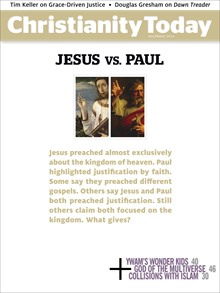Tony Richie on Kingdom of Heaven and Justification
Must Re-centralizing Jesus Mean Displacing the Spirit? A Review Essay of Scot McKnight’s “Jesus vs. Paul”
In this review essay, Tony Richie responds to Scot McKnight’s article that introduces a conversation among theologians.
 Scot McKnight, “Jesus vs. Paul” Christianity Today (December, 2010), pages 24-29.
Scot McKnight, “Jesus vs. Paul” Christianity Today (December, 2010), pages 24-29.
The December 2010 cover encapsulates the discussion:
Jesus preached almost exclusively about the kingdom of heaven. Paul highlighted justification by faith. Some say they preached different gospels. Others say Jesus and Paul both preached justification. Still others claim both focused on the kingdom. What gives?
Scot McKnight is an accomplished New Testament scholar and award-winning author whose work often has an innovative tone and, sometimes, a controversial twist. In “Jesus vs. Paul,” McKnight tackles a disturbing disjunction within Evangelicalism.1 An older generation of evangelicals tended to follow the Reformation tradition quite tightly, making Paul’s doctrine of justification the essential doctrinal rubric for individual salvation; but, a new generation of evangelicals has become entirely enamored with Christ’s kingdom teaching applying its social implications. Devotees of each approach tend be exclusive or dismissive of the other. A troubling dichotomy between gospels and epistles develops. McKnight considers this a serious crisis threatening the theological stability of church and academy. He thinks both approaches risk reductionism. However, he resists facile attempts at superficial harmonization. For McKnight, the solution resides rather in the concept of gospel itself, particularly as delineated by Paul in 1 Corinthians 15:1-8. The category of gospel, he argues, is broad enough to include both Jesus and kingdom with Paul and justification in a complementary, or perhaps better, in a comprehensive, manner.

Scot McKnight is Professor of New Testament at Northern Baptist Theological Seminary.
McKnight defines “gospel” summarily as the “saving story of Jesus that completes Israel’s story.” A prime benefit for McKnight is it’s re-centralizing of Jesus. He thinks that an overemphasis, that is to say, for all practical purposes, a sole emphasis, either on kingdom or justification tends to displace the person of Jesus, while the category of gospel places Jesus back at the center of what Scripture says, and of what Christianity is all about—faith in the person of Jesus Christ. McKnight has no problem producing multiple texts indicating that the New Testament calls for faith in Jesus as Lord and Savior rather than in his kingdom teaching or Paul’s views on justification. Accordingly, he argues against beginning either with kingdom or justification. Instead, McKnight says, “The gospel is the core of the Bible, and the gospel is the story of Jesus.” Therefore, he urges us to begin our hermeneutical and theological tasks with gospel.
McKnight summarizes “gospel” as the “saving story of Jesus that completes Israel’s story.”
Category: Biblical Studies, Summer 2011


